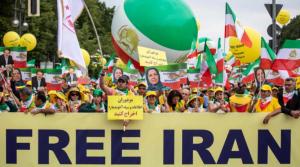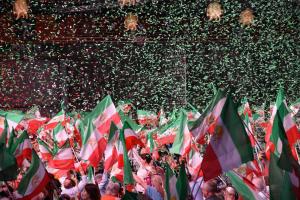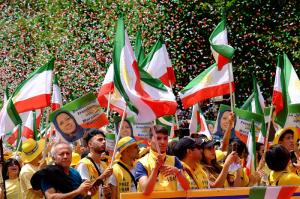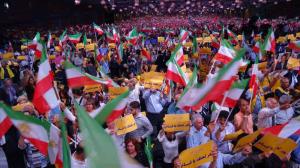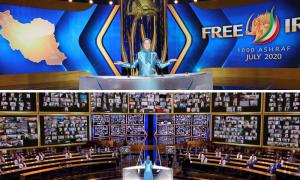
(PMOI / MEK Iran) and (NCRI): Supporters of Iranian resistance worldwide prepare for “The Free Iran Global Summit,” and people across Iran show their support for this annual gathering.
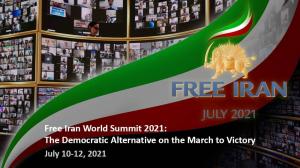
(PMOI / MEK Iran) and (NCRI): Supporters of Iranian resistance worldwide prepare for “The Free Iran Global Summit,” and people across Iran show their support for this annual gathering.
Amnesty International report in 2020 entitled ?Trampling Humanity,? noted that systematic torture of participants in the 2019 uprising went on for months.
Last September, seven top UN human rights experts said they acknowledge the failure of major world powers and international bodies to address early warnings about mounting human rights abuses in Iran.”
PARIS, FRANCE, July 4, 2021 /EINPresswire.com/ -- Last week, Iran?s special rapporteur on Iran?s human rights situation, Javaid Rehman, spoke out about the regime?s sham election and its President-elect and its history of human rights abuses. The current judiciary chief, Ebrahim Raisi, is poised to take over the presidency in August, following a massively boycotted ?election.?— NCRI
In the summer of 1988, Raisi was one of the main figures on a panel of judges and intelligence officials tasked with implementing a fatwa from the clerical regime?s founder and first supreme leader, Khomeini. An estimated 30,000 political prisoners were executed, marking the ?greatest crime of the Islamic Republic,? as the regime?s No. 2 official at the time, Hossein-Ali Montazeri, called it. The massacre targeted members and supporters of the leading pro-democracy opposition group, the Mujahedin-e Khalq (MEK).
The fatwa declared that the MEK was guilty of ?enmity against God? and that this alone made them subject to the death penalty. Khomeini specifically urged figures like Raisi to show ?no mercy? in their dealings with the opposition. Raisi has defended that position right up to the present day. In his first press conference as president-elect, Raisi even went so far as to say that he should be ?commended? for his record.
No one has been held to account for the past 30 years. Last September, six top UN human rights experts said they acknowledge the failure of major world powers and international bodies to address early warnings about mounting human rights abuses in Iran. This failure has, without question contributed to a culture of impunity.
If this impunity is not challenged immediately, the regime will conduct more murders and massacres. Raisi?s legacy as judiciary chief includes the first execution in decades for a person accused of consuming alcohol, as well as the high-profile executions of protesters like Navid Afkari, a champion wrestler who became the subject of a global campaign for justice. His 2018 arrest coincided with a period described by the Iranian Resistance?s President-elect of the National Council of Resistance of Iran (NCRI), Maryam Rajavi, as a ?year full of uprisings.?
That year of uprisings stemmed from a nationwide protest movement that spanned much of January 2018 and gave rise to Khamenei?s first public statement acknowledging the organizational power and social influence of a Resistance movement he had long attempted to write off. Since then, the regime?s warnings about the MEK have been fairly incessant. They have also been repeatedly justified by further large-scale expressions of dissent, including the organized boycott of the presidential election and a second nationwide uprising in November 2019.
It was that uprising, more than anything else, which revealed the violent repression of Raisi?s judiciary. Immediately after it broke out across nearly 200 cities and towns, the Islamic Revolutionary Guard Corps (IRGC) opened fire on crowds of protesters throughout the country, killing at the very least 1,500 people. Soon thereafter, the number of associated arrests rose to more than 12,000, and the judiciary began interrogations to secure false confessions.
Amnesty International issued a report in 2020 titled ?Trampling Humanity,? which noted that systematic torture of participants in the 2019 uprising went on for months. Although the international community has been aware of extensive details about that crackdown for over a year, it has yet to adopt any measures that hold Ebrahim Raisi, his judiciary, or the regime itself accountable for those human rights violations.
?In December 1988, the UN General Assembly? expressed ?grave concern? about a renewed wave of executions in the period July-September 1988? targeting prisoners ?because of their political convictions,? Javaid Rehman and his fellow human rights experts wrote last September. The failure of UN ?bodies to act had a devastating impact on the survivors and families as well as on the general situation of human rights in Iran and emboldened Iran to continue to conceal the fate of the victims and to maintain a strategy of deflection and denial that continue to date.?
If any Western policymakers or concerned citizens wish to hear firsthand testimony from those survivors and families, they will have an opportunity to do so between July 10 and 12 when they can tune into the Livestream of an annual gathering of tens of thousands of Iranians and political supporters, called the ?Free Iran World Summit.?
Their testimony will assuredly be accompanied by recommendations for how the international community can correct its former mistakes and show support for the Iranian people and their organized Resistance at this historical moment on the cusp of the Raisi era. Anyone who is seriously concerned about universal human rights should be fiercely committed to hearing out these recommendations, lest past betrayals of that principle are compounded in the weeks and months to come.
Shahin Gobadi
NCRI
+33 6 50 11 98 48
email us here
Visit us on social media:
Facebook
Twitter


